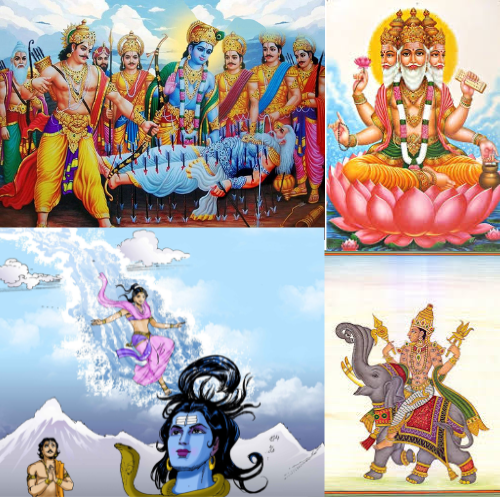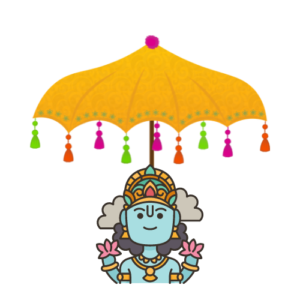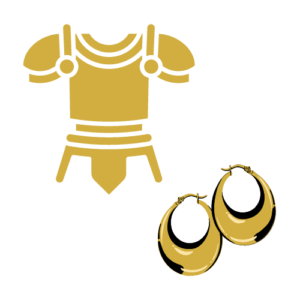
- Nakshatra Deity: The Proud Indra (who is the elder brother of Vamana-Vishnu) who has reached the throne and ruling the world.
- Symbols: Circular Amulet (Raksha), Kavacha-Kundala – like that of Karna, Umbrella.
- Kind: Teekshana (Sharp / Dreadful)
- Facing or Looking Towards: Triyangamukha/ Sideways
- No of Stars: 3
- Nick Name: The Eldest Sister, Senior-Most, Most experienced, The Chief, Most excellent or Most praiseworthy, The middle finger, The Holy River Ganges.
- Foundation Above: To Attack.
- Foundation Below: To Defend.
- Shakti (Power): Arohana Shakti (Power to Rise above Perils and conquer the subconscious, The power to rise, overcome, conquer and gain courage in battle).
- Final Desire: To gain supremacy among the Gods.
Puranic Stories:
- Brahma (called as Jyestha / Rohini)
- Indra – Tvastar – Vritra
- Indra – Durvaso Maharshi
- Bhishma – Ganga – Skuracharya
- Indradyumna – Agastya – Lizard – Nara Narayana
- Vinayaka (eldest of Shiva’s children)
ఇంద్రస్య రోహిణి శృణత్
పరస్తాత్ ప్రతిశృణత్ అవస్తాత్
Indra = The vedic solar deity. Who is sitting on the throne, very proudly.
Rohini = similar to the star Rohini is Prajapati – Brahma.
Shrunat = he is very attacking- like in a chess game. Attacking using elephant-goad. Hearing carefully a question from an elderly like a guru etc.
PratiShrunat = he is defending, like in a chess game. Hearing a counter-question from the same elderly person.
He is both attacking the enemies and defending his people.
Native is shuffling between war and peace or between materialism and spirituality. However, will stick to materialism.
Brahma-Rohini:
- Extremely creative people. They will be fascinated by their own creation.
- Will behave like a head of an institution / need independent decision making.
- He becomes the head of the organization or department he is working very soon (or will have rapid growth) after joining.
- Has ego problems with boss or father or husband (in case of a woman native).
- Does not respect elders / parents, especially if born as an eldest child (Daksha did not respect Shiva).
- First child may not obey the native. Sanaka-Sanandana – Sanat kumaras, Sati did not obey Brahma / Daksha in marriage.
- Jyestha is the biggest star in the universe.
- Brahma is always cursed by people but never appreciated. He is never given credit for the creation – instead Parvati is credited for it. Whereas always cursed by people for their ill-fates.
Indra – Tvastar – Vritra
- Jupiter was unhappy due to the arrogance and disrespect from of Indra and left him. The native may lose father at an early age. If mother is more powerful at home, native may pickup fights with mother. Has ego issues with the head of family or office.
- Indra went to Tvastar (Parabrahma) and requested another priest in place of Jupiter. Tvastar assigned his own son Vishwarupa in place of Jupiter. Native may have interim bosses to mentor him / or brought up by paternal or maternal uncles or most times native is self-taught in life.
- However, being a brahmin Vishwarupa assisted whoever approached, that included demons as well. Indra mistook him to be leaking their secrets to demons and killed him.
- This made Tvastar very angry and Tvastar created another powerful demon Vritra to fight Indra. Boss is unhappy with the native.
- Tvastar again helped Indra to approach Dadichi Maharshi to make Vajra from his bones. Ashwini Kumaras helped him.
- Dadichi died and he was brought back to life by Ashwinis using Sanjeevini. Boss helps the individual once again – there is love-hate with bosses.
Indra – Durvaso Maharshi
- Indra was celebrating victory of many years over the demons and Durvasa visits him.
- Durvasa blesses Indra and gives him a flower-garland. Indra places this garland on trunk of his elephant (Airavata).
- Durvasa is enraged as the elephant throws the garland down and stamps over it.
- Curses Indra to lose all the battles with demons.
- Gandanta: Indra approached Vishnu – who advised gods to drink the amrita (nectar) from churning the ocean.
- Overly proud native (or perceived proud by elders) – receives curses from elders.
- High on prejudice, jealousy, they think they are right always.
- People perceive natives as egoistic, jealous, bossy, opportunistic, not respecting elders.
- Overly juggling between materialism and spiritualism.
- Head of the family (father) is unavailable due to death / mother’s domination –or–
- Boss is unhappy because of native’s work. Husband is unhappy in case of women. There can be power tussles or independence requirements.
- During childhood, the native has a lack of proper guidance or mentorship.
- Many bosses changed while the native was learning in the job – native is more or less self taught or self-made in life and therefore haughty nature.
- Native generally dislikes elderly people as they may be from old school of thought / they underestimate the native.
- Natives are down-to-earth people and will offer protection to their family members like a fatherly figure – who scolds / punishes family and keeps things in order.
- Natives are constantly working for the welfare of the family.
- Will always defend the family. Will be worried about the members of the family.
- Natives are always protected by their parents or gurus. Once they are unhappy, its downturn for the natives.




Male Deer: Deer runs faster than all animals. Deer looks at Moon and will be in illusion. Horns of Deer get stuck often in thorns. Deer is very predictable, they often take the same route. They are afraid of driving in new routes.
Umbrella:In the Puranas, the umbrella (Chhatram) is a symbol of royalty, protection, and divine authority. It signifies the power and sovereignty of a ruler or deity. The umbrella is often depicted as a regal canopy held over a king or deity to signify their elevated status and divine protection. It also represents the protection and care extended to devotees or subjects. In iconography, the umbrella is a mark of dignity and the sheltering presence of divine or royal figures.
Amulet (Raksha / Taweez):
Spiritual Protection: Amulets are believed to offer protection from evil forces, negative energies, and physical harm. They are considered sacred objects imbued with spiritual power.
Divine Favor: They symbolize the favor of deities and are often used to invoke blessings and prosperity. Wearing or carrying an amulet is thought to attract divine grace and guidance.
Ritual Significance: Amulets may be used in various rituals and ceremonies to enhance their efficacy, providing a tangible connection to divine forces and spiritual protection.
.Armor and Earrings (Kavacha-Kundala): Karna is born with Sahaja Kavacha Kundala. Indra (the eldest) stole them from Karna (the eldest).
Yoga Tara: 14th Degree (Scorpio)
6 – MB for Ven | 14-MB for Moon |
*MB – Mrityu Bhaga
*Ex – Exaltation
Ego tussles with the head of the family (father / mother / husband).
Generally perceived as egoistic, jealous etc. by others. However, will take a fatherly role even though young in the family. May have ego issues with siblings – if they are very settled. Otherwise will stand as protection for them.
If Boss / Owner is miserly in spending for company’s welfare etc., natives will be unhappy with him. Natives prefer costly options for the company.
Will offer protection for the whole family. Will have a dominating voice.
Will act like a fatherly figure even though very young in the family.
May drink royal alcohols.
Jealous of siblings / relatives – if they are rich. Or very supportive of them if they are poor.
Mother could be raising the family as the father is dead at young age / father is ill / mother earns more.
Mother could be protecting the whole family / the native especially.
Mother could be jealous / having a dominating attitude.
Grand-father could be dominating in the village / family like a sarpanch etc.
He could be protecting the whole family.
Children could be dominating the native & protecting the native since very young age.
Enmity with Bosses or father. Jealous and highly dominative enemies.
Native protects the family or office colleagues from dominating enemies.
Native and wife are loggerheads and dominating each other on dominance.
Jealous of business partners richness.
Power tussles with competition.
Refer to 6th. Juggling between spirituality and materialism.
Wife’s family could be dominating and jealous.
Father could be very strict and very dominating. Native could have ego issues with father for domination.
Could have issues with bosses as well on domination / spending for right things.
Could be getting transfers very often.
Father and husband may have ego issues between each other.
Many bosses have changed in the start of the job. Native is self-taught, self-made etc.
Egoistic / dominating boss. Native has progressed in life materialistically.
Could be juggling between spirituality and materialism.
Read 10th.
Elder brother is dominating. He could be protecting the native like a father.
Refer 6th.
